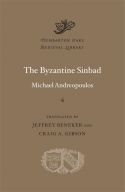From the Harvard University website:
The Byzantine Sinbad collects The Book of Syntipas the Philosopher and The Fables of Syntipas, both translated from Syriac in the late eleventh century by the scholar Michael Andreopoulos.
Originally written in Persian and part of a multilingual and multicultural medieval storytelling tradition, The Book of Syntipas recounts how the Persian king Cyrus’s unnamed son—a student of the fictional philosopher Sinbad, who is known in Greek as Syntipas—is falsely accused of rape by a royal concubine. While the young man awaits execution, seven philosophers and the concubine attempt to influence Cyrus’s judgment. After seven days of storytelling, the son is exonerated and demonstrates the wisdom he learned from Syntipas.
The sixty-two moral tales in The Fables of Syntipas are inspired mainly by the tradition of Aesop but include fifteen that are uniquely attributed to the philosopher.
This volume is the first English translation to bring together Andreopoulos’s Byzantine Greek texts.
About Craig Gibson
Professor Craig Gibson is chair of the Department of Classics at the University of Iowa.
Gibson studies ancient Greek and Latin oratory, rhetoric, and prose fiction (“novels”). For the past twenty years, he has focused on ancient and medieval Greek rhetorical education, which has led him to write on such disparate topics as the moral and societal implications of rhetorical training, and the portrayal of doctors, artists, good dogs, and mythological and biblical characters in textbooks and classroom exercises. He most enjoys the challenges of researching and translating texts that have never before been translated into English, including a medieval Latin treatise on arithmetic with Hindu-Arabic numerals, Didymus’ commentaries on the orator Demosthenes, collections of model rhetorical exercises, and medieval prose fiction. His articles have been published in journals including Byzantine and Modern Greek Studies, Classical Philology, Classical Quarterly, Journal of Late Antiquity, and Greek, Roman, and Byzantine Studies. He joined the UI faculty in 1999.
